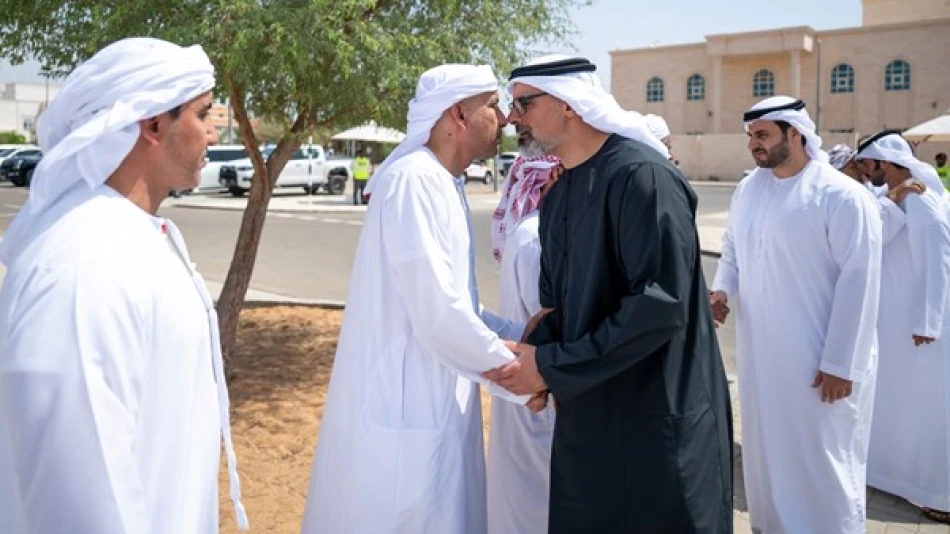
Emirati Leader Offers Condolences on the Passing of Prominent Businessman
Abu Dhabi Crown Prince Honors Emirati Traditions with Personal Condolence Visit
Sheikh Khaled bin Mohamed bin Zayed Al Nahyan, Crown Prince of Abu Dhabi and Chairman of the Abu Dhabi Executive Council, personally attended funeral ceremonies to offer condolences for the passing of Saeed Amer Al Neyadi, father of prominent official Humaid Saeed Al Neyadi. The high-profile visit underscores the UAE leadership's commitment to maintaining close personal ties with citizens and preserving traditional Emirati customs of communal mourning.
A Display of Leadership Accessibility
The Crown Prince's attendance at the funeral gathering in Um Ghafa majlis in Al Ain region reflects a distinctive aspect of UAE governance—the accessibility of senior leadership to ordinary citizens during significant life events. Sheikh Khaled extended condolences not only to Humaid Saeed Al Neyadi but also to the deceased's sons: Abdullah, Mohammed, Rashid, and Amer.
During the ceremony, the Crown Prince offered prayers for the deceased, asking for divine mercy and paradise, while expressing hopes that the family would find patience and solace during their time of grief.
Senior Officials Demonstrate Unity
The funeral was attended by several high-ranking UAE officials, highlighting the collective respect shown by the Abu Dhabi administration. Notable attendees included:
Sheikh Khalifa bin Tahnoun bin Mohammed Al Nahyan, Chairman of the Abu Dhabi Crown Prince Court, Sheikh Zayed bin Saeed bin Zayed Al Nahyan, Mohammed Ali Al Shorafa, Chairman of Abu Dhabi Department of Municipalities and Transport, and Saif Saeed Ghobash, Secretary-General of the Abu Dhabi Executive Council and Head of the Crown Prince's Office.
Cultural Significance in Modern Governance
This personal approach to condolences represents a broader UAE leadership philosophy that balances rapid modernization with deep-rooted cultural traditions. Unlike many global capitals where senior officials maintain formal distance from citizens, the UAE's leadership regularly participates in traditional social customs, from wedding celebrations to funeral rites.
Such gestures serve multiple purposes: they reinforce social cohesion, demonstrate that rapid economic development hasn't eroded traditional values, and maintain the personal bonds between rulers and citizens that have historically defined Gulf governance structures.
Implications for Social Stability
These traditional practices contribute to the UAE's reputation for social stability and citizen satisfaction. By maintaining personal connections across different social levels, the leadership reinforces legitimacy through cultural continuity rather than relying solely on economic performance or institutional authority.
The attendance of multiple senior officials also signals internal governmental unity and shared commitment to traditional protocols, factors that international observers often cite when assessing the UAE's long-term political stability and investment climate.
Most Viewed News

 Layla Al Mansoori
Layla Al Mansoori






